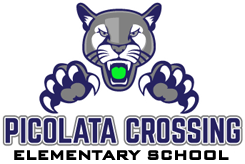This year we are working with all of the classes during the week they have Media as their resource. Ms. Stadt teaches KG, 2nd and 4th grade classes and Mrs. Bishop teaches 1st, 3rd and 5th grade classes. We will work with students on various topics such as character education, friendship skills, feelings, etc. Check back each month to see what we focus on and how you can help reinforce these things at home.
August-September-Lesson 1
Our first lesson with all of the classes at Picolata will be an Introduction to the School Counselor. Students will learn what school counselors do. We will talk about what school counselors can help them with, such as problems they have at school or home, helping with feelings or friendships, etc. We discussed how school counselors can work with them one-on-one with issues they may be having. Students learned about other things school counselors do such as working with students in a small group and coming into the classroom for a guidance lesson.
Kindergarten:
First Grade:
- Book: My Counselor is a Princess by Joey Acker and Melanie Acker
Second Grade:
Third Grade:
- Meet the School Counselor Jeopardy Game
Fourth Grade:
Fifth Grade:
- True, True, Not True Role of the School Counselor Game by the Savvy School Counselor
October-November-Lesson 2
Kindergarten:
First Grade:
- Introduction to Bug Feelings and Bubble Breathing-Lesson from Puzzle Pieces
- Book: The Color Monster by Anna Llenas
- Our first grade students were introduced to Bug Feelings. Bug feelings are those feelings that we don’t like to have and want to get rid of (anger, sad, lonely, confused, embarrassed, etc.) Children often display undesirable behaviors (fighting, tantrums, disrespect, etc.) simply because they do not have the feelings vocabulary to properly express what they are feeling. We will be focusing all year on how to get rid of bug feelings (or de-bug). During this lesson, we talked about the rules for letting out our bug feelings. 1. I may not hurt myself. 2. I may not hurt property. 3. I may not hurt others. One of the main ways that people hurt themselves is by holding in their feelings. These feelings then come out in physical ways such as queasy stomachs, headaches, etc. Many people think that it is OK to slam a door or throw something that breaks. While this may make you feel better momentarily, there are always consequences for our actions. Not only are you still mad or sad, but you have broken property. Finally, we discussed the two ways we hurt others: with our bodies as well as with our words. Neither are OK ways to deal with bug feelings. Students also learned the first strategy for “de-bugging”-bubble breathing (or deep breathing). Students learned how to slowly breathe in through their nose and then blow out, like they are blowing a bubble, through their mouth. This is something that can help us calm down, no matter our age!
Second Grade:
Third Grade:
- Conflict Types-Lesson from The Responsive Counselor
- Our third graders learned about the different types of conflict. We talked about the differences between a disagreement, a rude moment, a mean moment and bullying. These are all often confused and all mistaken for bullying, so it is important to learn the difference between each type. We learned that a disagreement is when people have different ideas about something and usually no one’s feelings are hurt. A rude moment is hurting someone’s body or feelings on accident. A mean moment is hurting someone’s body or feelings on purpose and it happens just one time or every once in awhile. Bullying is hurting someone’s body or feelings on purpose, more than once and the person doing it has more power (older or bigger, more than one person or someone you are afraid of). Students worked in groups to examine situations and decide which type of conflict each was.
Fourth Grade:
Fifth Grade:
- Flipping a Lid – Lesson by The Responsive Counselor
- We learned about our brains and how our brain plays an important part in our thoughts and our feelings. Students learned about 3 parts of our brain-the prefrontal cortex (aka the Wise Owl), the memory saver (aka the Hippocampus) and the amygdala (aka the Guard Dog). Students learned that when their guard dog is in control and they are not in trouble, sometimes they may flip their lid. We talked about how the guard dog tells our brain to fight, flight or freeze. Students learned that when their guard dog takes over and they are not in trouble, we need to work to get our Wise Owl back in control. Students brainstormed ways to calm their brain and get their wise owl back in control when they flip their lids.
